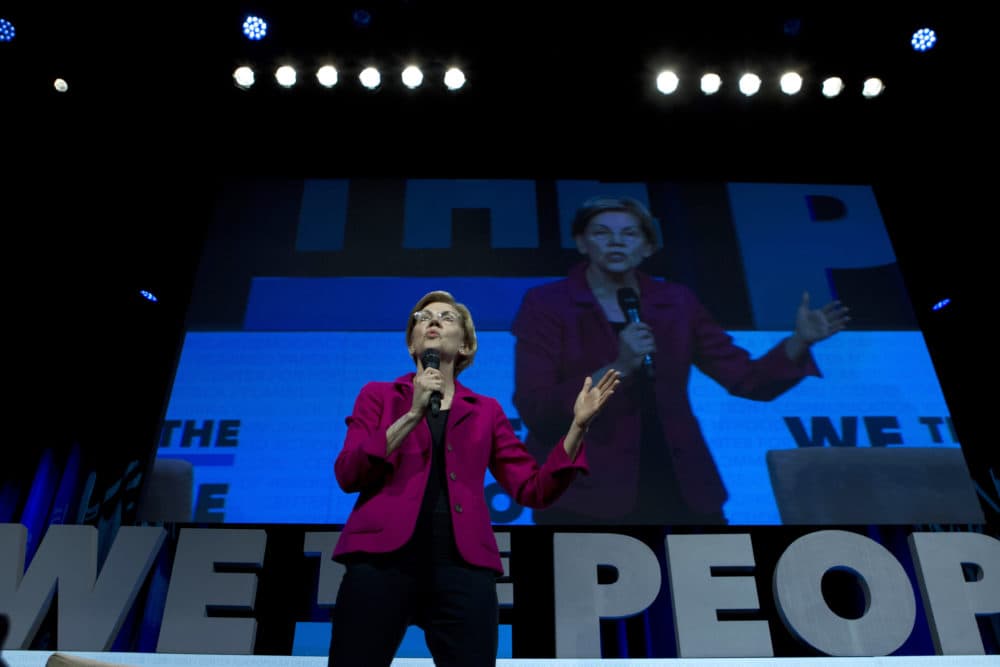Advertisement
In California, Warren Faces Pushback Over Her Call To Break Up Big Tech
Resume
Elizabeth Warren’s call to break up giant tech companies like Google and Facebook is just one in a barrage of major policies she's proposed that are broadly aimed at curbing the power of corporations and the super wealthy.
This time, however, the 2020 Democratic presidential candidate's proposal to check Big Tech may complicate her relationship with a state that has traditionally been a cash cow for her. California is home to three of the four companies Warren has explicitly targeted in her plan: Apple, Facebook and Google. The state is also rich in wealthy political donors and primary delegates alike.
The Massachusetts senator has sworn off courting wealthy donors in the Democratic primary, and it takes a lot of money to compete in the Golden State. Although delegates are awarded proportionately, the rewards in terms of momentum for the presidential candidates are potentially huge — especially as California has bumped up its primary date to early March of 2020.
So what might this all mean for Warren in California?
Lisa Gritzner — a Los Angeles political consultant who has worked with Google, Microsoft and Uber — says Warren’s proposal might play well with some on the “extreme ends” of the Democratic Party. But, she says it's unlikely to do well with the majority of Californians who fall on both sides of the political spectrum.
“This is where people come to start their companies, their startups, their dreams,” Gritzner says. “And so the idea that all of a sudden somebody decides you're too big or they don’t agree with the way you’re conducting your business and the government comes in and takes over — that’s not exactly the kind of sentiment I think that the majority of Californians hold.”
Warren’s plan has two main thrusts:
-- First, it would harness the power of existing federal regulatory agencies and antitrust tools to take apart existing mergers. Imagine Facebook being forced to give up Instagram, which it acquired for $1 billion in 2012.
-- Second, Warren would introduce legislation that prohibits giant companies that offer a public online marketplace or exchange from participating on their own platforms. This second arm would designate companies with annual global revenue exceeding $25 billion – like Google and Amazon – as “platform utilities.”
Mark Gonzalez, chair of the Los Angeles Democratic Party, admits Big Tech might need more regulation, but says Warren’s plan is unlikely to be palatable for most Californians.
“She makes a point in terms of how tech industries need to be regulated, but we have to be able to work with them as well, because they do provide sustenance to the entire state,” Gonzalez says. “There are Democrats who are pragmatic and who are business-friendly, and you know, that’s who we’re going to work with, and that’s basically the future. I think folks might think there is a little bit of a disconnect between what she’s saying versus what is actually going on.”
But what about the tech workers? In California, tens of thousands of them work directly for Google and Facebook. More than 1.5 million work in high-tech jobs around the state.
According to Zhihan Zou, executive director of the Democratic Party in San Francisco, rank-and-file tech workers are bigger fans of regulation than one might think.
“A lot of these young tech workers see tech as a way to improve the lives of everybody, but they’re also seeing the negative consequences,” Zou says. “And the majority agree that there needs to be some accountability and that they have a certain level of responsibility to the communities that they are impacting.”
A survey of California tech workers earlier this year finds 59 percent say the tech industry should be more regulated.
Zou also points out that 60 percent of San Francisco voters last fall approved a new tax on big businesses aimed at bolstering city homelessness programs. The fight over Proposition C, as it was listed on the ballot, lured in big-name tech executives on both sides.
Millions of dollars in personal and company money were poured into the battle. For example, Jack Dorsey, CEO of Twitter and Square, spent more than $100,000 to fight the measure. Salesforce chief Marc Benioff spent over $7 million in personal and corporate money in favor of Prop C.
“I think that comes from years of seeing this vast wealth growth here in San Francisco, in the Bay Area, in Silicon Valley,” Zou says. “We’re seeing billions of dollars pour in; the city [has] completely changed in many aspects. A lot of people here in San Francisco at least feel that the big tech companies haven't done enough to actually help bring those benefits to a broader group of people.”
Beyond tech workers, in the big picture, California — with its huge number of Democratic delegates — is important to all the candidates.
So how is Warren perceived by the party at large out there?
Sherry Bebitch Jeffe, a longtime professor and political analyst at the University of Southern California, says the older, more traditional wing of the Democratic Party in California — the wing that really holds the reins of power there — are wary of Warren.
“The younger, the Bernie-crat wing of the California Democratic Party views her positively, has some enthusiasm for her … but there isn’t the kind of magic that followed [former Democratic presidential candidate and Sen.] Bernie Sanders around in 2016,” Jeffe said. “The more old-school establishment Democrats? Not so much. Viewed at best with skepticism. Viewed at worst with disdain."
But voter support is not all Warren is looking for in California.
In her most recent U.S. Senate campaign, Warren has received more individual contributions from California than any other state except Massachusetts.
Californians gave her Senate campaign over $3.1 million in 2017 and 2018, and an analysis of itemized federal campaign filings shows more than half of that money came from the tech-heavy Bay Area.
This year, California has delivered again for Warren. She raised nearly $400,000 from California in 2019 — once again more than in any other state behind Massachusetts.
Yet, Warren performed poorly overall in the state compared to other Democratic candidates, ranking seventh in fundraising.
Which circles back to the question of whether Warren’s focus on policy, coupled with her decision to shun big donors in the primary, will pay off in a huge grassroots voter turnout — or burn her ability to pay to keep the campaign going.
Wilnelia Rivera, former strategist for Rep. Ayanna Pressley’s congressional campaign, says she isn’t quite sure how the numbers will add up over time.
“Only time will tell whether that risk is going to end up imploding her campaign or propelling her campaign in a way that puts her ahead,” Rivera says. “These next three months are going to be important, because if it doesn't seem that they're keeping up, I think voters are going to make a different kind of conclusion.”
It’s a point well taken: A mid-April poll of California Democrats shows Warren running well behind Sanders, former Vice President Joe Biden and California Sen. Kamala Harris. (Biden is the only one of those names who has not yet formally announced a 2020 run.)
A half-dozen other state and national polls also consistently show her squarely in the middle of the pack.
And so far, Warren’s ability to tap unto her grassroots network just doesn’t come close to her fellow New Englander, Sanders. While Warren raised more than $6 million from more than 135,000 individual donors in the first three months of her campaign, Sanders raised at least $18.2 million from 525,000 individual donors.
This segment aired on April 24, 2019.

